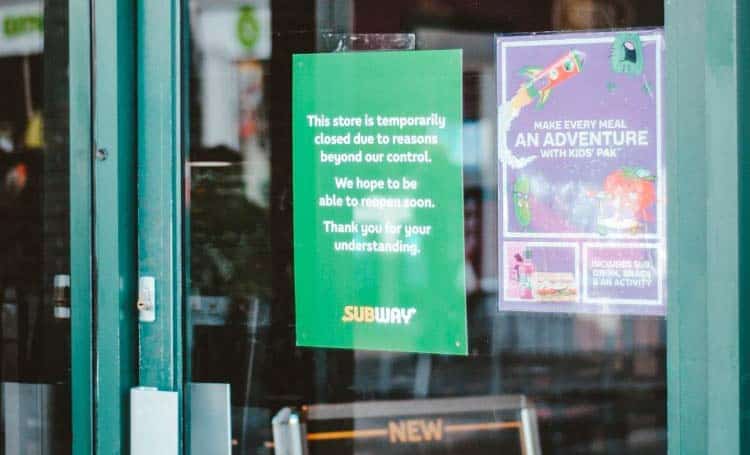7 Tips for Pivoting your Marketing Strategy During COVID-19

You had a marketing plan all set to go for Q2. Maybe it was focused on summer fun, like travel and sports.
Then March hit, and the whole thing had to be thrown out the window.
Where do you go from here?
This pandemic won’t go away overnight, letting us all pick up where we left off. So businesses need to pivot their marketing strategies to reflect the current state of affairs — not how we wish things were.
Here are seven ways that your business can tweak your marketing for Q2 — and beyond — as we all learn to navigate the new 2020.
#1 Manage expectations
We’ve all received at least a dozen emails from companies we’ve done business with, updating us on their COVID-19 response. While they may seem like more inbox clutter, they serve an important purpose.
As this situation continues, supply chain interruptions have gone from possibilities to inevitabilities. Some companies may have to alter their business model significantly in order to stay competitive in a changing market.
If your customers are facing shipment delays, longer than usual response times, or interrupted service, let them know in advance. Emails are good, but you should also be sharing the message on your website and your social media. Get it out there everywhere you can so your customers won’t be surprised and upset.
#2 Increase content marketing

Although some states are slowly reopening restaurants and other businesses, others are still locked down. And as people have adjusted to the “at home” lifestyle, they’ve spent more time online than ever.
Some are looking to learn new skills and increase their industry knowledge. Others are just looking for connections or entertainment. But whatever the reason, people spent 20% more time in apps in Q1 2020, including Facebook, Twitter, and LinkedIn. And Facebook reports that traffic from their platform to other sites has risen over 50%.
This means it's a great time to provide useful and entertaining content to your audience and promote it on social media for a boost in web traffic. You’ll increase brand recognition and improve your SEO. The time investment now may pay off when the economy stabilizes.
#3 Focus on building leads for future sales
This may not feel like an appropriate time for selling. But if you’re waiting for things to get “back to normal” before you work on filling your client pipeline, you’ll feel the sting in the future.
There won’t be a day, week, or even month where everything just reopens and we go back to business as usual. The return to normalcy is going to be a long, drawn-out process. And there may be resurgences of this illness that require us to return to our homes.
So you need to prepare now for future sales opportunities and build your leads. If you generate leads through email, consider using this time to make a new lead magnet to gather email addresses. Or try a Facebook lead generation campaign to get people to view a demo, subscribe to a newsletter, or register for a webinar.
#4 Keep posting on social media

Even if your brick and mortar store is closed, you need to keep up with your social sharing. Posting consistently builds and maintains brand awareness with your followers. Plus, if you stop posting on social media, your organic engagement will plummet when you do start sharing again.
However often you were posting before this all began, maintain that schedule. Even better — post a bit more.
You can do throwback posts to previous events or launches, build buzz for a future project, or share personal anecdotes from employees or team members. You could also share industry news or educational resources. A cocktail of useful and entertaining content will help keep your followers engaged until you’re ready to get back to your normal content.
#5 Think about a PPC campaign
With uncertain financial times, many companies are cutting back their ad spend. That means there are less competition and reduced cost per click for you.
Facebook’s worldwide CPM, or cost per thousand impressions, hit an all-time low of $1.95 in early April of this year. That’s 36% lower than the average over the past two years. And a Facebook pay-per-click campaign (PPC) that cost $0.11 per click in January this year was down to $0.09 in March.
Now, this is an overall average — some industries haven’t seen the same changes. Do a little research on trends in your specific industry before you invest the time and money into a PPC campaign. But for many, fewer companies focusing on PPC means better pricing and less competition for your prospect’s attention.
#6 Offer education
If you’ve ever thought about launching an online course, either for revenue or to improve your industry authority, now is the time to do it.
LinkedIn Learning professional development courses saw a 3x increase in time spent on courses in April vs. January. And Cornerstone Learning, which offers employee training to a variety of companies, saw a 75% increase in course registrations in March.
People are taking this extra time to learn new skills, so what can you teach? An online course can live on your own website, or there are sites like Teachable and Thinkific where you build your course.
#7 Mind your message

Consumers don’t mind that companies are advertising and marketing right now. One survey showed that only 8% think companies should stop advertising. But marketing messages during a global crisis need to be carefully considered to avoid insensitive or downright offensive content.
Avoid messaging about travel and exploration. And stay away from images that include people touching or gathering in groups. Even if it’s just meant as a metaphor, people are particularly sensitive right now and it’s important to take their concerns seriously.
Instead, focus on how you can relate to people and provide help during this difficult time. Provide encouragement and support for your audience. Instead of aiming for the sale, try to connect with your prospect. They’ll think of you when they’re ready to buy.
Focus on that pipeline
It’s tempting to want to cut every ounce of fat from your budget during these lean times. But businesses who continue to invest in their audience and finding leads will be the ones that bounce back much more quickly as the situation improves.
Don’t slash the marketing budget just yet!
Author: Rudy Labordus
Rudy Labordus is an Internationally acclaimed author, marketing strategist and speaker. He has been instrumental in helping launch and develop several multi million dollar businesses around Australia and excels in developing innovative, strategic and creative solutions that produce exceptional results for his clients.
